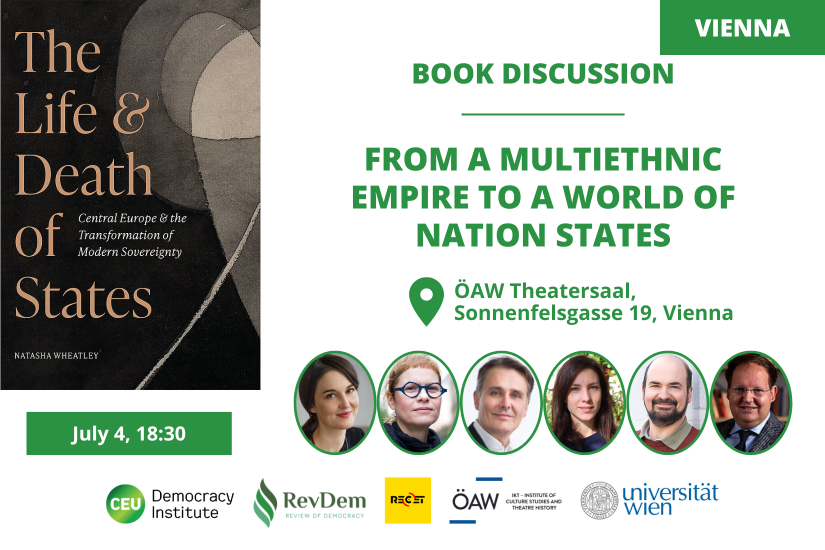
The CEU Democracy Institute’s journal, Review of Democracy, the Research Center for the History of Transformations (RECET), the Institute of Culture Studies and Theatre History at the Austrian Academy of Sciences (ÖAW/IKT) and the Department of European, International and Comparative Law at the Faculty of Law at the University of Vienna cordially invite you to a book discussion on Central Europe's function as a laboratory of our current world order.
Natasha Wheatley's bold and fascinating new book The Life and Death of States: Central Europe and the Transformation of Modern Sovereignty (Princeton University Press 2023) rediscovers the multinational Habsburg polity as a hothouse for ideas that still shape our understanding of the sovereign state. Mapping the history of nesting nationalities in an intricate dynastic empire, the book explains how a regime of self-contained nation-states theoretically equal under international law emerged from the ashes of the Habsburg polity. Wheatley sheds rich light on how the Habsburg Monarchy was turned inside out, how its constitutional and legal arrangements were mapped onto the globe after its demise. Apart from tracing the Empire's afterlife up to the decolonization movements of the twentieth century, Wheatley offers riveting insights on the chronopolitics of sovereignty: In the context of the Habsburg polity, Central European jurists pioneered the crucial legal fiction of the supposed immortality of states, their capacity to hibernate and to re-emerge for a fresh lease of life.
Panelists:
- Natasha Wheatley is an historian of modern European and international history, with broad interests in intellectual and legal history, Central Europe, and the history of international law. She acts as assistant professor at Princeton University. The Life and Death of States: Central Europe and the Transformation of Modern Sovereignty is her first book.
- Peter Becker is a Professor of Austrian History and the History of the 19th and 20th Centuries at the University of Vienna. He is the author and editor of numerous books. His research focuses on the Habsburg Monarchy in a comparative perspective.
- Franz L. Fillafer is a historian of Central Europe who is particularly interested in its global settings and significance. His most recent book is Aufklärung habsburgisch: Staatsbildung, Wissenskultur und Geschichtspolitik in Zentraleuropa, 1750–1850 (2nd ed., 2022).
- Eva-Maria Muschik is an Assistant Professor in Development Studies from a Global History Perspective and Head of the Department of Development Studies at the University of Vienna. She is the author of Building States The United Nations, Development, and Decolonization, 1945–1965 (2022)
- Renata Uitz is Co-director of the CEU Democracy Institute and Professor of Comparative Constitutional Law at the CEU Department of Legal Studies. Her major research interests lie in transition to and from democracy, the protection of individual autonomy and religious liberty. Her current work focuses on illiberal constitutional practices and the normalization of illiberal constitutionalism.
Moderator:
- Jannis Panagiotidis is Scientific Director of RECET. From 2014 until 2020, he was Junior Professor for Migration and Integration of Germans from Russia at the Osnabrück University Institute for Migration Research and Intercultural Studies (IMIS). At RECET, he works on a project entitled “Liberal Global Orders and Freedom of Movement.” He is the author Postsowjetische Migration in Deutschland: eine Einführung (2021) and of The Unchosen Ones: Diaspora, Nation, and Migration in Israel and Germany (2019).